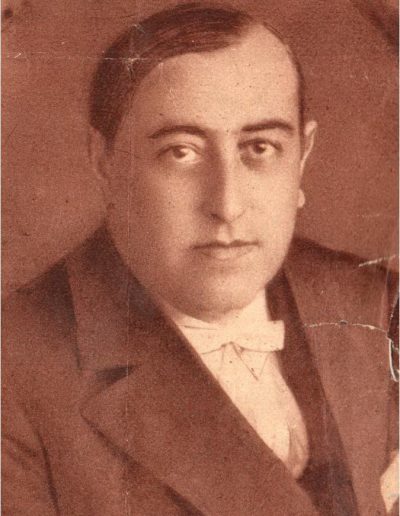Markovits Rodion (Markovits Jakab)
July 15, 1884, Kisgérce, Austro-Hungarian Monarchy - August 27, 1948, Timişoara, RomaniaHungarian writer and journalist
He was born in Kisgérce. Reb Jakov, his grandfather, settled in the village of Gherța Mică and married the daughter of the only Jewish family in the settlement. József Markovits, his father, studied in an outing and also acquired knowledge of general culture. Being the richest Jew in the village and a connoisseur of the book, he read from the Torah of the Sabbath and, at one point, became the president of the Orthodox Jewish community in the village of Turț. Among the relatives of the Markovits family were several rabbis. The life and creation of Jakab Rodion (adopted his first name from Rodion Raskolnikov, the hero of the novel Crime and Punishment by Dostoevsky) were strongly influenced by three fundamental elements: the native village with its geographical and ethnographic landscape; his life experience in Russian captivity with unimaginable difficulties and twists; attachment to Jewish tradition and religion with its essential components - respect for the book, rational spirit, kindness and humor. (s. János Szekernyés)
He attended high school in Satu Mare and studied law in Târgu Mureş and Budapest. During his studies he published articles and short stories. In January 1915 he enlisted in the Austro-Hungarian army and was taken prisoner in June 1916 in Russia. He spent seven years in Siberia, where he worked very hard in Krasnoyarsk. During this period he wrote Szibériai Újság, the Hungarian-language publication of prisoners in Krasnaia Recika.
In 1921, Rodion Markovits settled in Satu Mare, practicing law and publishing in the interwar Hungarian press: Szamos and Keleti Újság. In 1926 he published in the Keleti Újság newspaper in Cluj an advertisement inviting former prisoners in Russia to tell their stories. He used their testimonies in writing the volume Siberian Garrison, subtitled "collective novel-report", which appeared as a pamphlet in Keleti Újság between April and August 1927. In 1928 it was published in two volumes. In two years it has been translated in 14 countries and has become an international bestseller. There has been much discussion about the categorization of the work - a documentary novel or a collective report - because it is a mixture of fiction, diary and historical document. Its literary value has been challenged by some critics who have blamed it for the unilaterality of the story, the careless style, the confusing composition. However, the book was and remains a fascinating expression of a shocking war experience.
In the novel Sánta farsang, 1933 (translated into Romanian: Câşlegi într-un picior) we find memories from the childhood spent in the village, and in the volume of short stories Reb Ancsli és más avasi zsidókról szóló széphistóriák, 1941 (Reb Ancili and other stories about Jews , translated into Romanian in 2014), a spirit and style very close to Yiddish literature.
Like other writers of his generation, e.g. Malraux, Shaw, Panait Istrati, André Gide, Markovits had leftist, communist views. In Timişoara he was in a group of left-wing intellectuals such as the poet Endre Károly, the poet and writer Robert Reiter (pseudonym of Franz Liebhard) or the artist Julius Podlipnyi.
Rodion Markovits continued to publish articles in Temesvári Hirlap in the post-war years, in Timişoara, and after the war, in Szabad Szó and other publications. For several years, Markovits was the president of the Association of Hungarian Language Writers in Banat.
He died suddenly, in his sleep, on August 27, 1948 and was buried in the Jewish Cemetery in Timişoara.
Forgotten for about 15 years after his death, the attention of publishers turned, sporadically, to the work of Rodion Markovits. In 1965 a new edition of the book Siberian Garrison appeared, and in 1970 a volume with his journalistic works, edited by János Szekernyés. After the 1989 Revolution, interest revived. The garrison from Siberia was republished in Dacia Publishing House, his work was included in a commemorative anthology of writers from Satu Mare County, his stories Reb Ancsil ... were translated into Romanian and published in a bilingual edition. The family home of the writer from Gherța Mică became the Rodion Markovits Memorial House.
Publications
- ⦁ Ismét találkozom Balthazárral (Novellas, Satu Mare 1925)
- Szibériai garnizon (kollektív riportregény, Kv. 1927; new edition in 1965, introduction by József Méliusz; Kv. 1981, introduction Kovács Nemere; Kriterion Könyvkiadó 2005, (Szekernyés János előszavával)
- Aranyvonat (Budapesta, 1929; Kriterion, Kolozsvár, 2011; Kráter Műhely Egyes. 2012)
- Sánta farsang (Bp. 1933; Bucarest 1967)
- Reb Áncsli és más avasi zsidókról szóló széphistóriák (Timişoara 1939); Reb Áncsli és más avasi zsidókról szóló széphistóriák/ Reb Ancili and other stories about the Jewry of Oaș (translation Felician Pop, Kriterion, Cluj, 2014.)
- Páholyból (Din lojă) (válogatott publicisztikai írások, Szekernyés János szerkesztésével és utószavával, 1970)
Sources
- Szekernyés János, Egy világsiker eredöi, öszetevöi és utórezgései http://www.multesjovo.hu/hu/aitdownloadablefiles/download/aitfile/aitfile_id/1437/
- Markovits Rodion in wikipedia
https://hu.wikipedia.org/wiki/Markovits_Rodion - Andrea Ghiță, The writer Rodion Markovits was commemorated by the people of Satu Mare (in the online magazine Baabel) http://baabel.suprapus.ro/2013/09/andrea-ghita-scriitorul-rodion-markovits-a-fost-comemorat-de-satmareni/
